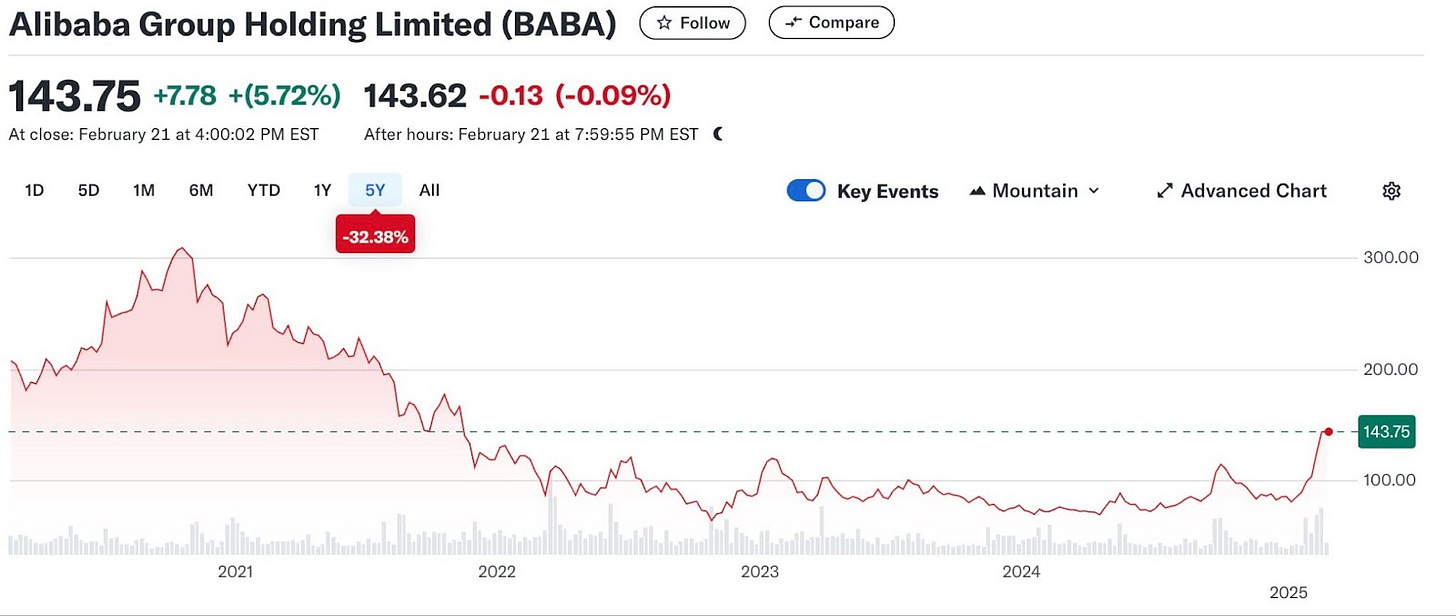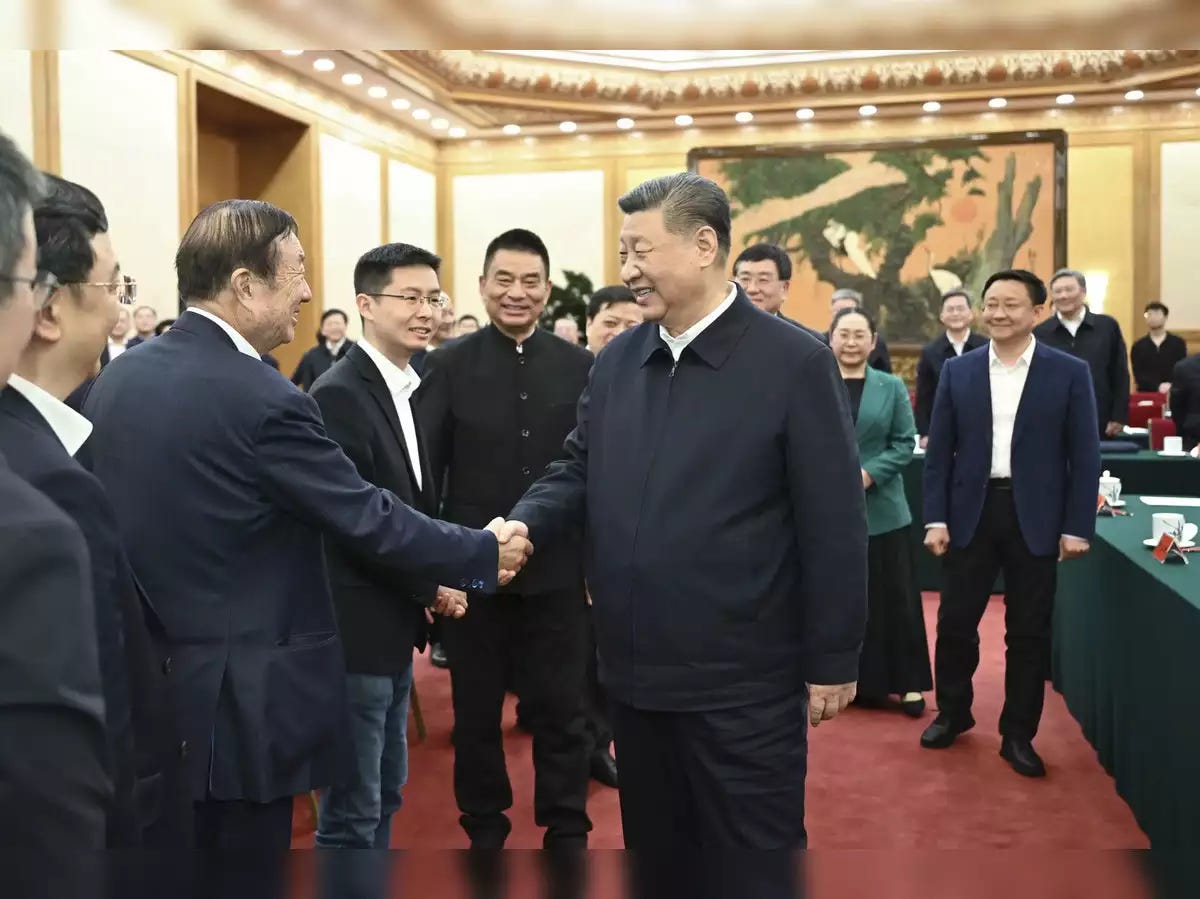Welcome back,
This week is a redemption issue for Alibaba and Jack Ma. When the chips were down and the stock price was tanking, who’d have thought it would be artificial intelligence that would revive the e-commerce giant’s fortunes… and thanks to a wave started by an entirely different company.
That’s where we are today—oh and a major meme trader is also backing the business to the tune of over $1 billion in stock.
Elsewhere, we have news of Singapore’s big push on its struggling domestic stock exchange, and details of how Jack Ma got back into the limelight as part of Beijing’s new effort to back its domestic tech titans.
All that and more for you in this week’s newsletter.
Best,
Jon
Follow the Asia Tech Review LinkedIn page for updates on posts published here and interesting things that come our way. If you’re a news junkie, the ATR Telegram news feed has you covered with news as-it-happens or join the community chat here.
Alibaba never left but the e-commerce giant is enjoying an impressive run lately thanks to its AI chops.
The company beat revenue estimated for the third quarter in last week’s earnings report but its commitment to invest “aggressively” in AI is what got investors frenzied and sent the shares up 14%. Seizing the moment, Alibaba put a number on that pledge: $53 billion.
This year to date, BABA stock is up nearly 70%—we aren’t yet back at glory levels but it’s an impressive bounce that appears to have plenty of momentum.
Alibaba has invested not only in its own AI products and services (Qwen—which it claims outperforms DeepSeek) but it is also a backer of a number of China’s OpenAI rivals: MiniMax, Baichuan and Moonshot, each of which has a multi-billion dollar valuation.
No doubt the company is surfing the momentum from DeepSeek, but it also has its own legs, including a partnership with Apple to bring AI services to Chinese iPhones, which we covered in last week’s newsletter.
Finally, to add an unusual angle, Ryan Cohen—the GameStop CEO and Chewy founder—has reportedly built a position in Alibaba that’s worth $1 billion.
I have to admit this wasn’t the Alibaba comeback that I saw coming. What a world we live in.
Elsewhere: We wrote about Chinese tech stocks surging in the previous newsletter and it was another good run last week with Hong Kong’s tech index jumping 6.5%, its highest since 2022, and China’s STAR 50 Index rising 6%, the most in four months link
Redemption doesn’t often happen in Chinese politics but Jack Ma seems to have done as well as anyone could.
After watching Ant Group’s massive (expected) IPO collapse at the eleventh hour in 2020, potentially due to Ma’s insatiable ambition and ego, Ma was among the tech leaders who took part in a very public summit with Chinese President Xi Jinping.
The country’s leader drew many of the biggest names in Chinese business over the past decade, representing industries from chipmaking and electric vehicles to AI. The summit demonstrated Beijing’s softer stance toward the companies that fuel most of the economy, just as Washington ramps up a potentially debilitating campaign of global tariffs.
Beijing has gone head-to-head with Chinese tech firms over the past five years, seeking to check their growing power. But times have changed and the US-Sino trade war pits both countries’ tech sectors against each other, so Beijing appears to be backing its charges with more solidity than we’ve seen for some time.
Bybit, officially a Dubai/Singapore-based exchange led by Chinese executives, was hit with the largest hack in the history of crypto as it lost $1.5 billion.
It is thought that North Korean hackers carried out the attack which nabbed Ethereum from one of Bybit’s cold wallets, a wallet typically used for storage rather than regular transactional activity. Bybit co-founder and CEO Ben Zhou claimed the hackers were able to spoof a user interface which tricked the signatories who approve Bybit’s cold wallet transactions into giving it control of the wallet.
It’s not clear how the attackers got into a position to be able to do that. North Korea’s Lazarus group, a loose collection of hackers who operate on behalf of the country, have gained a lot of attention for social engineering attacks on crypto companies. Getting employees to click malicious links and download software to grant access to networks has helped the regime collect more than $3 billion from crypto hacks.
The Bybit hack is its largest to date and it emphasises the problem the crypto industry faces. It’s often been cautioned that Lazarus is quietly sitting inside many companies, unknown to executives, and it certainly looks like that was the case for Bybit..
I’ve written about Lazarus and North Korea’s crypto obsession before—it makes a lot of sense.
Singapore’s stock market is struggling and, in true fashion, the government has developed a plan aimed at reviving it with lots of money and incentives for investors, as the FT explains:
The Monetary Authority of Singapore announced a package of measures on Friday to help turbocharge the city-state’s equity market, which has suffered from more delistings than initial public offerings in recent years.
Among the proposals — which included tax incentives for companies and investors, along with a more streamlined listings process — was a plan to invest S$5bn ($3.7bn) in funds that are focused on the local equity market.
Domestic and international investors will be invited to pitch for the funds, which come with specific investment requirements.
Shein is under pressure to cut its valuation to around $30B—less than a third of its peak—as shareholders push for the move to boost its potential UK IPO, sources say link
Shein’s net profit dropped nearly 40% to $1B in 2024, below its earlier $4.8bn projection link
Meanwhile TikTok Shop is grabbing more market share from Shein despite a potential ban in the US link
OpenAI says it found evidence of a Chinese AI-powered tool tracking anti-China posts on Western social media link
NetEase’s billionaire CEO has slashed jobs and prioritised a smaller slate of games that are focused on being profitable—even still NetEase returned to profit growth in Q4 with a rebound in its gaming business link
ByteDance’s valuation has rebounded past $400B with major investors marking it up despite US shutdown risks—the jump is thanks to its AI unit, Doubao, and an increasing belief that TikTok is strong outside of the US and that China still generates 80% of ByteDance’s profit—also, losing the China business could mean fewer hurdles for an IPO, which is a very glass half full approach link
Huawei founder Ren Zhengfei told Xi Jinping that China’s chip and software concerns had eased, according to state media reports link
In predictable news of the week: TikTok’s return to US app stores sent rival Xiaohongshu’s downloads plunging 91% in five days, according to data from Sensor Tower—though daily users remain 25% above pre-delisting levels link
DeepSeek will open-source five code repositories this week in a move reaffirming its commitment to transparent AI link
But DeepSeek is at a crossroads as its chatbot’s rapid growth strains resources—Alibaba and others are said to be keen to invest if the firm chooses to take outside capital for the first time link
Tesla faces a potential delay in securing Chinese approval for its autonomous driving tech amid rising US-China trade tensions link
Indian authorities seized $190M in crypto tied to the infamous BitConnect Ponzi scheme link
Lenskart aims to go public at a $10B valuation, that would be double its previous private round valuation, when it files papers for a listing in the coming months link
Udaan raised $75M UK’s M&G and Lightspeed at flat valuation of $1.8B link
Apple’s new iPhone 16e is being assembled in India for local sale, with some exports to selected countries link
Following similar reports from Coinbase, fellow US-based cryptocurrency exchange Kraken is planning to re-enter the Indian market and is in discussions with local authorities to obtain the necessary licenses link
Uber is shifting to a daily fee model for rickshaw drivers in India, moving away from commissions amid rising local competition link
Licious, a Temasek-backed Indian meat and seafood seller, is planning a 2026 IPO with a target of $2B, up from a $1.5B valuation in 2023 link
Google is reportedly close to picking sites in India for its first retail stores outside of the US link
Grab shares fell after its full-year revenue forecast missed estimates link
Meanwhile Grab is doubling down on AI, and looking into expanding its self-driving car push as it continues to prioritize profitability, according to its CFO link
Shopee may not be prioritizing its food delivery business so publicly after it refocused on fundamentals, but a new report suggests it has already overtaken Gojek on volume—the overall food delivery market in the region grew 13% last year, more than doubling previous annual growth figures link
PropertyGuru laid off 174 employees as it closed 3 units due to restructuring link
Taiwanese chip firm ASE Technology just opened its largest overseas site in Malaysia and tripled its local workforce to 6,000 employees as part of an expansion into robotics and AI link
US fintech Robinhood plans to launch crypto services in Singapore this year via Bitstamp, the crypto exchange it previously acquired link
Singapore contributes less than 1% of Nvidia’s revenue, a senior official said, as the US probes whether Chinese AI startup DeepSeek sourced chips via the country link
About 7,000 people rescued from illegal call centers in Myanmar await transfer to Thailand as part of a regional crackdown on cyber scams link
Korea has suspended new downloads of DeepSeek across the country—it initially started by banning it among government agencies—because it violates personal data protection laws, with data allegedly being sent to ByteDance link
South Korea aims to secure 10,000 GPUs for national AI computing centre link
An investor group plans to build a $35B AI data center in South Korea, signaling strong demand despite doubts about the AI boom link
Brian Koo, from the family behind LG Group and once a backer of bankrupt startup Honestbee, is among those backing what aims to be South Korea’s largest data center—Stock Farm Road link
Tokyo startup Sakana AI has walked back initial claims that its new AI CUDA Engineer system can accelerate AI development by up to 100 times by automating code for Nvidia GPUs link
Long-time Sony exec Shuhei Yoshida recalls how the PlayStation first came together following a collapsed alliance with Nintendo link
iPhone supplier Murata eyeing large-scale M&A to drive growth, CEO says link
Japanese officials warn that China’s tighter export controls on key semiconductor materials threaten global supply chains link
A high-level Japanese group, including ex-PM Yoshihide Suga, is urging Tesla to invest in struggling automaker Nissan after its failed $58B merger with Honda link
Hong Kong just hosted Coindesk’s Consensus event and it used the moment to announce it will dive deeper into crypto products, including new token listings, derivatives trading and more link







